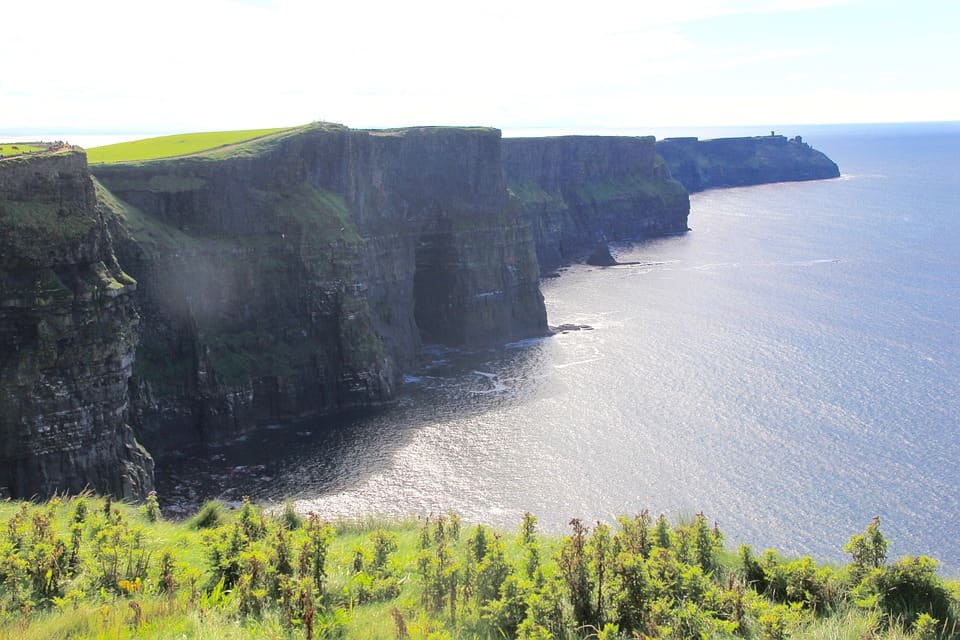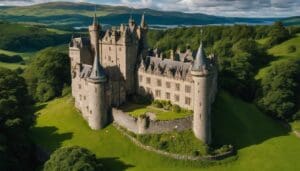Discover the Wild Atlantic Way: An Unmissable Irish Coastal Road Trip

Updated On: April 23, 2024 by Ciaran Connolly
Are you planning a trip to Ireland and looking for a memorable experience you won’t forget quickly? Then, it would help if you experienced the Wild Atlantic Way. At an impressive 1600 miles long, it’s one of the world’s longest scenic coastal routes.
The Wild Atlantic Way is one of the best ways to experience Ireland’s mesmerising beauty. It’s promoted as a tourist trail that begins on the west coast of Ireland, passing through nine counties, from the beautiful County Cork to the unforgettable County Donegal.
The Wild Atlantic Way offers so much to uncover; hop in your car and experience the rugged west coast, majestic cliffs, captivating Irish villages, ancient monuments, and enchanting Irish landscape.
This is one road trip where you won’t ever get bored because there is so much to discover and encounter. It’s a once-in-a-lifetime trip that you’ll remember forever.
Keep reading to find out more about this fantastic Irish coastal road trip.
Table of Contents
The Wild Atlantic Way Coastal Route

Pack your bags, grab your friends, prepare a road trip music playlist, and head to your car. Leave everything behind and get ready to embrace the west of Ireland as you take on the Wild Atlantic Way coastal route.
You’ll drive through six regions in Ireland, showcasing the best of what the emerald island offers. Then, you’ll go home and tell your friends about this unforgettable Irish road trip.
But first, let’s look at the dreamy coastal route; you’ll want to dedicate at least 10 days to complete the entire road trip. You can take the route in many different ways, but we suggest starting in County Cork at the Old Head of Kinsale discovery point.
Going south to the north means you’ll be on the ocean side of the road, so you’ll enjoy the scenery fully.
Along the route, signs with the WAW logo point out many discovery points, making it easier to experience the highlights of the coastal route.
Key Points of Interest Along the Wild Atlantic Way – West Cork
The Old Head of Kinsale
As you begin your journey in Cork, it’s a must to discover the Old Head of Kinsale, as mentioned above. It’s considered a coastal paradise, full of moments when you’ll want to grab your camera and capture the surroundings. Once you arrive, exploring the area on foot is best for enjoying its beauty.
It’s one of the most popular spots along the Wild Atlantic Way, home to a world-class golf course with spectacular ocean views. The area is also famous for its historic lighthouse, the iconic black and white ‘Old Head Lighthouse’, established in the 17th century.
Old Head of Kinsale is also home to award-winning accommodation and a magnificent spa, making it the perfect start of your Wild Atlantic Way adventure.
Galley Head
Next, head to the discovery point known as Galley Head. Another Irish lighthouse dominates this area, home to some of the most beautiful sandy beaches in West Cork, including Red Beach, Long Beach, and Owenahincha Beach.
It is located 9.5 kilometres southeast of Rosscarbey along the Wild Atlantic West.
Lough Hyne
As you journey, stop at Lough Hyne, just 5km from Skibbereen, County Cork. Lough Hyne is famous for its unique marine life and is the only inland lake in Northern Europe.
Here, you’ll discover an enclosed lake with a rich landscape, taking you to a tranquil world. One of the best ways to enjoy this beautiful lough is to participate in a Moonlight/Starlight experience with Atlantic Sea Kayaking.
It’s a unique experience. The beautiful environment will enchant you as you travel from dusk into darkness in a kayak. It’s a magical experience, and we highly recommend doing this if you can.
Mizen Head
Another highlight on the West Cork part of the Wild Atlantic Way route is Mizen Head, Ireland’s most Southwesterly point. This point offers a wealth of maritime history to explore. It stretches to the Atlantic Ocean, captivated by sea cliffs and a striking landscape.
One of the best things to check out in Mizen Head is the Mizen Head Signal Station, perched above the Atlantic waves on a tiny island that connects you to the mainland. It offers incredible views.
These are just a few of the highlights on the West Cork part of the Wild Atlantic Way, and more places/attractions include Timoleague Abbey, Toe Head, and Barely Cove.
Castlemaine to Kenmare Highlights:
This next part of the Wild Atlantic Way is considered one of the most popular parts of the journey, where you’ll see famous sites such as The Ring of Kerry and Skelling Michael.
White Strand
Stop off at this beautiful white sandy beach, one of the prettiest in County Kerry, and just take a moment to soak up the views and relaxing atmosphere. It’s also close to Castlecove, which is worth checking out while you are there.
Ring of Kerry
This is one of the most popular attractions on the Wild Atlantic Way, a stunning scenic drive along the Iveragh Peninsula. Here, you’ll uncover some of Ireland’s most picturesque landscapes.
Along the Ring of Kerry, points of interest include Muckross House, Staigue Stone Fort and Rossbeigh Beach. The route between Killorglin and Sneem will take you along the Ring of Kerry Route.
Coomanaspic
One of our favourite spots along this Irish coastal route, Coomanaspic Pass, offers an ancient mountain landscape. Suppose you manage to reach the top, which we recommend. In that case, you won’t be disappointed with the beautiful panoramic views of Valentia Island (one of the most westerly points in Ireland) and across to Dingle Bay.
Skelling Michael
Off the coast of Kerry are two magical islands: Skellig Michael and Little Skellig. They are a must-see for any tourist coming to Ireland. You can take a boat trip to Skellig Michael, home to an ancient monastic community that dates back to the 8th century.
The journey to the island itself should be classed as an attraction. The views are incredible as you glimpse the awe-inspiring islands rising tall from the sea.
In 1996, the island was given UNESCO World Heritage status and featured in Star Wars: The Force Awakens.
All tours to the islands depend on weather and sea conditions.
Dingle Peninsula Highlights
The next part of the Wild Atlantic Way road trip is to experience the Dingle Peninsula, home to incredible beaches and the friendly town of Dingle, steeped in history, literature, and music.
Dingle Town
If you’re looking for somewhere nice to stay to help break up your road trip, we highly recommend Dingle Town. The friendly fishing town has great places to eat and stay and lots to see. Dingle is famous for its wealth of literature and is one of Ireland’s creative hubs.
You’ll be sure to find live traditional music in every pub here, as you can imagine, music plays a huge part in Irish culture. The people are friendly and will make you feel right at home, and you might even meet one of Dingle’s most famous visitors, Fungi the Dolphin, down by the marina.
Blasket Sound
This stop on the Wild Atlantic Way coastal route is one you don’t want to pass by. It is often acknowledged as one of the most gorgeous spots in Emerald Island. Located west of Dingle Peninsula, this dreamy landscape is one of the discovery points along the route.
Here, you’ll find another world-class Irish beach, Carrignaparka Beach. Every beach in Ireland is unique; this one won’t disappoint you with its beauty. Blasket Sound is also right next to the head of Dunmore Head, with a short hike you can reach.
Once you reach the top of Dunmore Head, you’ll come across more magnificent views of Blasket Sound and the Blasket Islands. You are making the climb worthwhile.
Minard Castle
Another unmissable attraction on the Dingle Peninsula, part of the Wild Atlantic Way, is the historic Minard Castle. The 16th-century castle ruins are located on the hill above Kilmurry Bay, backing out to the Irish Sea.
The attraction will request your undivided attention as you explore its ancient ruins and surrounding landscape.
Dunbeg Fort
Stop by the incredible Dunbeg Fort, another part of ancient Ireland built during the Iron Age. The fort is perched on the edge of a cliff overlooking Dingle Bay.
A visitor centre is also located here, where you can learn about the fort’s history, view audiovisual displays, visit a craft room, or enjoy a bite to eat at the restaurant and cafe.
The Burren and West Clare Highlights
Drive towards West Clare on the Wild Atlantic Way road trip, where you’ll feel like you’ve been transported to a fantasy world with the spectacular attractions and sights you’ll meet along the way.
Lahinch
The first stop on this journey should be Lahinch, a pretty little town often popular with visitors to the area. It’s a great place to spend a day or two as you navigate the Wild Atlantic Way.
The town is bursting with energy and very inviting. It is located right at the head of Liscannor Bay and offers 2km of golden sandy beaches to soak up. Lahinch has been a favourite among surfers due to its unique location, which provides the best surfing conditions.
It is the perfect place for those who enjoy water sports, including swimming, canoeing, fishing, and sailing.
Burren
This is one of the unique landscapes you’ll encounter on the Wild Atlantic Way route. The Burren is surrounded by picturesque greenery and hills and is famous for its remarkable variety of plants and animals. It’s estimated that over 70% of Ireland’s flower species are located here.
It would help if you explored this fantastic landscape to find all its hidden gems that aren’t immediately apparent.
Cliffs of Moher
This attraction is one of the most visited places in Ireland and is best known for its mesmerising sights of Ireland’s west coast. The uniquely formed cliffs, perched over the Atlantic Ocean, are truly awe-inspiring.
This is one sight you’ll want to capture so you can forever remember the unforgettable moments on offer.
On a clear day, you’ll be greeted with views from Aran Island and Galway Bay. Also, stop at the Cliffs of Moher Visitor Centre to uncover its fascinating history and learn more about the area.
Clifden to Galway Highlights
The coastal road trip continues down narrow roads with stunning views of the Atlantic Ocean on show. This part of the Wild Atlantic Way is one of the Gaeltacht regions, where nearly half of the Irish language community lives. The region is filled with solid Irish language traditions and culture.
Things you shouldn’t miss out include…
Inishmore
This is the biggest of the three Aran Islands in Galway Bay, popular amongst tourists and locals. You can explore the island on foot; it is famous for its Christian sites, such as Dun Aonghasa. But to reach the island, you must take a ferry from Dollin or Rossaveal in Connemara.
If you stay over, there are excellent accommodation facilities around the island. Inishmore is also home to a small museum and the Aran Sweater Market, a popular visitor spot.
Roundstone
Another must-stop on the Wild Atlantic Way road trip is the picturesque town of Roundstone in Connemara. The place is considered an area of outstanding natural beauty. From the pretty Irish houses to the intimate harbour, there are photo opportunities everywhere.
Pearse Cottage, Gortmore
Take time to visit Pearse Cottage in the famous Connemara landscape, which includes rich green hills and beautiful lakes. The cottage is named after Patrick Pearse, one of Ireland’s famous writers and political activists, who played a dominant role in Irish history.
At the cottage, there is a dedicated exhibition of Pearse for those interested in finding out more about his influence on Irish history.
Unforgettable Experiences of Ireland
These attractions don’t cover half the places and areas you’ll encounter on the Wild Atlantic Way. If you continue your journey, visit Achill Island, Clew Bay, Donegal Bay, Sligo, The Slieve League Coast, and Fanad Head, ending in the Inishowen Peninsula.
Each area has so much to offer visitors, and you’ll soon realise that Ireland is genuinely mesmerising for a small country.
The Wild Atlantic Way offers one of the best ways to experience Ireland up close and personal, discovering hidden gems and the captivating landscape that has inspired people for centuries.
Have you ever driven around the Wild Atlantic Way coastal route? Or have we inspired you to plan a road trip? Share with us in the comments below 🙂






